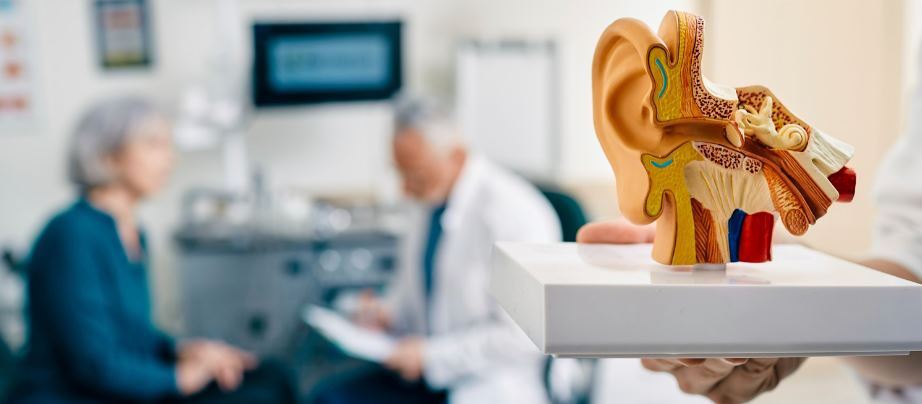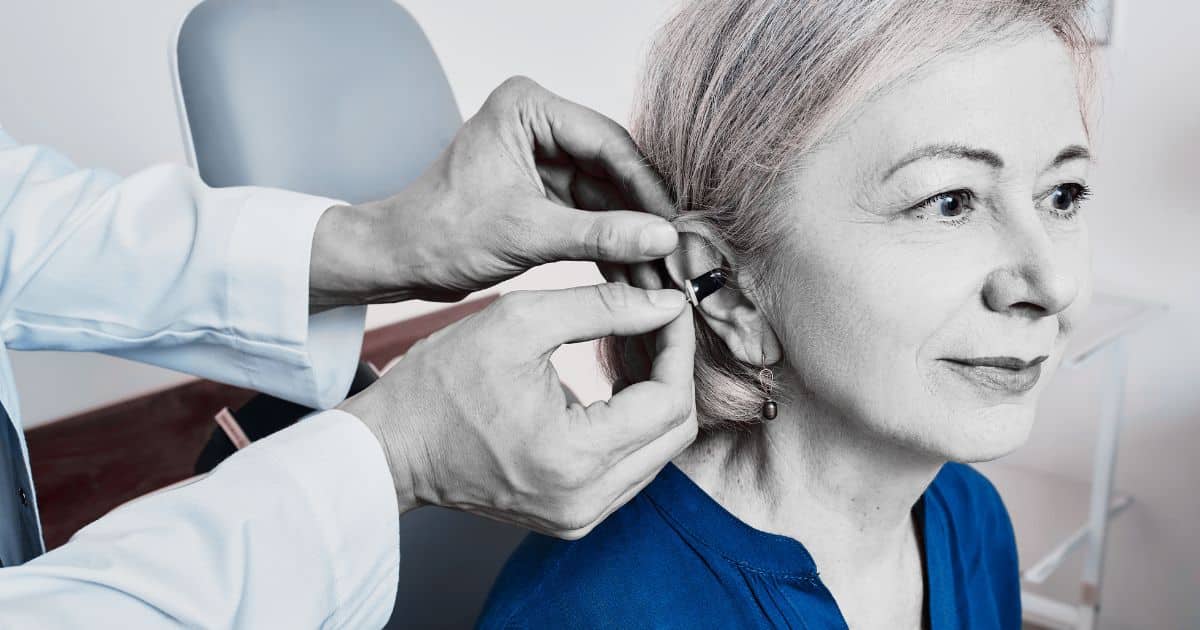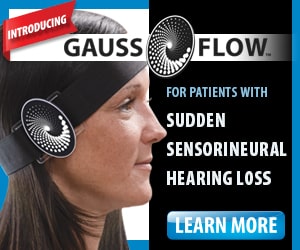By Becky Lansen, SVP and GM of Specialty, Health & Wellness, Synchrony
Navigating hearing loss can be daunting, especially with the rise of over-the-counter (OTC) options following the FDA’s ruling in 2022, which allows consumers to buy a hearing aid without a prescription or professional fitting. The sheer variety of OTC devices, coupled with the complexity of hearing loss itself, can leave individuals overwhelmed and uncertain about which product is right for them.
While OTC hearing aids offer a convenient and sometimes less expensive route to better hearing, the expertise of an audiologist remains invaluable in ensuring that patients receive the right hearing aid for their specific needs.
However, finding and affording an audiologist can be challenging, especially given the financial barriers that many consumers face. A recent study found that fewer than 20% of U.S. adults with hearing loss use hearing aids due to obstacles like high cost. This highlights a significant gap in care, as many individuals may be compromising their hearing health by bypassing professional support.
Why an Audiologist’s Expertise Matters
Everyone’s hearing capabilities are unique, based on factors such as the severity of their hearing loss, lifestyle, and the environments in which they spend most of their time, and so are their needs when it comes to hearing aids. An audiologist can provide a comprehensive hearing assessment, recommend the most suitable hearing aid, and ensure the device is properly fitted and fine-tuned to the patient’s specific requirements.
Unfortunately, research has shown that only half of consumers would be willing to talk to a healthcare provider about their hearing if they developed noticeable symptoms (56%), or if the hearing assessment were free (43%).
Audiologists can offer ongoing support, help patients adjust to their new hearing aids, troubleshoot any issues, and make necessary adjustments over time. This level of personalized care helps achieve the best possible outcomes, particularly for individuals with more complex hearing needs that OTC devices alone may not address.
Despite the promise of OTC hearing aids, there are many obstacles that consumers may encounter when trying to manage their hearing loss on their own. One of the primary concerns is that OTC devices may not be suitable for those with more severe or complex forms of hearing loss, such as those who experience tinnitus, fluctuating hearing levels, or sudden hearing loss. Without a thorough assessment from an audiologist, patients may unknowingly select a device that exacerbates their condition or fails to address it adequately. This can result in frustration, further damage to hearing, and, ultimately, a delay in receiving the appropriate care.

Additionally, OTC hearing aids do not come with the same level of customization that a prescription device offers. Audiologists use sophisticated diagnostic tools and software to program prescription hearing aids to match the exact nature of the patient’s hearing loss.
This level of precision can make a substantial difference in the quality of life for individuals, particularly those who rely on hearing aids in demanding environments like work, social gatherings, or places with background noise.
Finding a Qualified Audiologist
When searching for an audiologist, it’s important to consider several factors when identifying and selecting the best care possible:
- Understanding the Role of an Audiologist: Beyond just providing hearing tests and fitting devices, audiologists play a critical role in the long-term management of hearing health. They are trained to identify various types of hearing loss, diagnose the underlying causes, and provide comprehensive treatment plans. Whether it’s for hearing loss due to aging, exposure to loud noises, or medical conditions such as Meniere’s disease, audiologists offer tailored solutions.
- Professional Credentials: Look for audiologists licensed and certified by recognized professional bodies, such as the American Speech-Language-Hearing Association (ASHA) or the American Academy of Audiology (AAA). These certifications indicate that the audiologist has met rigorous educational and professional standards.
- Patient Reviews and Referrals: Reading patient reviews and seeking referrals from trusted sources can provide valuable insights into an audiologist’s quality of care. Word-of-mouth recommendations from friends, family, or healthcare providers can also be a good place to start and can serve as a guide to reputable professionals.
- Communication and Rapport: Establishing a good rapport with an audiologist is essential for effective long-term care and having an open dialogue creates a space to more freely ask questions or discuss any concerns. Communication is key, particularly when it comes to adjusting devices, troubleshooting issues, or explaining complex aspects of hearing loss. Building this trust allows patients to feel comfortable throughout the process, leading to better outcomes and higher satisfaction.
- Accessibility and Convenience: Consider the location of the audiology clinic and its hours of operation. An audiologist who is conveniently located and offers flexible appointment times can make it easier to access ongoing care.
- Frequency of Visits: For those with hearing impairment, seeing an audiologist isn’t a one-time event. Regular check-ins are often necessary to ensure that hearing aids are functioning correctly, adjustments are made as hearing needs evolve, and the patient’s overall hearing health is monitored. It’s generally recommended to visit an audiologist at least once a year, but the frequency may fluctuate depending on the severity of hearing loss and changes in the patient’s hearing capabilities.

Audiology Care Affordability and Financial Planning
While there are several benefits of working with an audiologist, the cost of these services can be a concern for many patients. Fortunately, there are several financial options available to help manage the costs of hearing aids and audiology care:
- Exploring the Costs of Hearing Aids: Hearing aids can range in price from several hundred to several thousand dollars per pair, depending on the technology, features, and brand. Many people are surprised by the out-of-pocket costs, especially since most health insurance plans do not cover hearing aids. This is where careful financial planning becomes crucial, as individuals will need to budget for not only the devices themselves but also the ongoing care and maintenance that comes with professional audiology services.
- Health Insurance: Some health insurance plans offer coverage for hearing tests and hearing aids, although the extent of coverage can vary. Patients should review their insurance policy carefully and speak with their provider to understand what is covered.
- Flexible Spending Accounts (FSAs) and Health Savings Accounts (HSAs): FSAs and HSAs allow patients to set aside pre-tax dollars to pay for medical expenses, including hearing aids and audiology services. Using these accounts can help reduce the overall cost of care by using pre-tax funds for these expenses.
- Third-Party Financing: Financing options, like CareCredit, can be a valuable resource for managing out-of-pocket healthcare costs. The CareCredit credit card is accepted in more than 11,000 audiology and hearing practices across the country and is a convenient and reliable solution that offers financing options for qualified consumers. By fulfilling the evolving needs and expectations of patients, CareCredit is a tool that empowers people to pay for the health and wellness products and services they want or need in a way that fits their lifestyle.
Looking Ahead
Innovations such as artificial intelligence may soon play a significant role in hearing care. Audiologists could leverage AI-based tools to analyze complex audiograms, predict hearing aid performance, and offer real-time adjustments to patients’ hearing devices remotely.
This would allow for a more seamless experience and reduce the need for frequent in-person visits. Additionally, teleaudiology services are gaining traction, enabling audiologists to offer consultations and device adjustments virtually, increasing access to care, particularly in rural or underserved areas.
As we look to the future of hearing care, the balance between accessibility and professional expertise will continue to shape the landscape. While OTC hearing aids have expanded options for many, audiologists are essential for many patients seeking personalized care.
By combining technological advancements with professional guidance and utilizing payment plans that meet the unique needs of each patient, better hearing outcomes can be achieved without compromising on the quality of care. As the industry evolves, the collaboration between patients, audiologists, and third-party financial providers will help ensure more people can access the hearing solutions they need.
About the Author
 Becky Lansen is the SVP and General Manager- Specialty, where she is responsible for the strategic vision and growth for SYF’s Health & Wellness Specialty markets. Prior to this role, Becky held various commercial roles within SYF, including the SVP, GM for the Venmo Credit Card, where she was responsible for the launch and development of this new card, and the SVP of Strategic Initiatives for PayPal, where she created and oversaw growth strategies and initiatives across various products. She led strategic planning during SYF’s IPO as the VP of Strategic Planning, and led the team that built a new online banking system after SYF’s acquisition of MetLife Bank as the Deposits Digital Leader. Prior to SYF, she worked at various marketing agencies in NYC. Becky holds a Bachelor’s Degree from the University of Richmond and an MBA from New York University.
Becky Lansen is the SVP and General Manager- Specialty, where she is responsible for the strategic vision and growth for SYF’s Health & Wellness Specialty markets. Prior to this role, Becky held various commercial roles within SYF, including the SVP, GM for the Venmo Credit Card, where she was responsible for the launch and development of this new card, and the SVP of Strategic Initiatives for PayPal, where she created and oversaw growth strategies and initiatives across various products. She led strategic planning during SYF’s IPO as the VP of Strategic Planning, and led the team that built a new online banking system after SYF’s acquisition of MetLife Bank as the Deposits Digital Leader. Prior to SYF, she worked at various marketing agencies in NYC. Becky holds a Bachelor’s Degree from the University of Richmond and an MBA from New York University.







